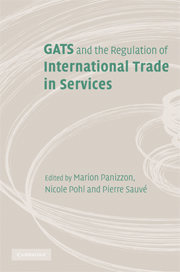Book contents
- Frontmatter
- Contents
- Contributors
- List of figures
- List of tables
- List of abbreviations
- Preface
- PART 1 Beyond regulatory control and multilateral flexibility: Gains from a cosmopolitan GATS
- PART 2 Unexplored economic, political and judicial dimensions of GATS
- PART 3 The limits of request–offer negotiations: Plurilateral and alternative approaches to services liberalisation
- PART 4 GATS case law: A first assessment
- 10 Lessons learned from litigating GATS disputes: Mexico – Telecoms
- 11 From Periodicals to Gambling: A review of systemic issues addressed by WTO adjudicatory bodies under the GATS
- 12 Specificities of WTO dispute settlement in services cases
- 13 Can foreign investors in services benefit from WTO dispute settlement? Legal standing and remedies in WTO and international arbitration
- PART 5 Market access, national treatment and domestic regulation
- PART 6 Unfinished business: Safeguard and subsidy disciplines for services
- PART 7 Challenges to the scope of GATS and cosmopolitan governance in services trade
- PART 8 Conclusion
- Index
- References
12 - Specificities of WTO dispute settlement in services cases
from PART 4 - GATS case law: A first assessment
Published online by Cambridge University Press: 03 September 2009
- Frontmatter
- Contents
- Contributors
- List of figures
- List of tables
- List of abbreviations
- Preface
- PART 1 Beyond regulatory control and multilateral flexibility: Gains from a cosmopolitan GATS
- PART 2 Unexplored economic, political and judicial dimensions of GATS
- PART 3 The limits of request–offer negotiations: Plurilateral and alternative approaches to services liberalisation
- PART 4 GATS case law: A first assessment
- 10 Lessons learned from litigating GATS disputes: Mexico – Telecoms
- 11 From Periodicals to Gambling: A review of systemic issues addressed by WTO adjudicatory bodies under the GATS
- 12 Specificities of WTO dispute settlement in services cases
- 13 Can foreign investors in services benefit from WTO dispute settlement? Legal standing and remedies in WTO and international arbitration
- PART 5 Market access, national treatment and domestic regulation
- PART 6 Unfinished business: Safeguard and subsidy disciplines for services
- PART 7 Challenges to the scope of GATS and cosmopolitan governance in services trade
- PART 8 Conclusion
- Index
- References
Summary
This chapter considers the overall record of GATS claims in WTO dispute settlement. Part I examines the GATS-specific rules of the WTO dispute settlement and the role they have (or have not) played to date in the GATS cases heard in the WTO dispute settlement system. Part II catalogues the consultation requests where GATS issues have been raised and the results of those requests and the Panel/Appellate Body decisions on GATS issues and the implementation results. Part III then considers (a) preliminary issues that have arisen or might arise in GATS cases (e.g. the effective date of GATS; how conflicts with other WTO agreements are treated); (b) the consequences of overlapping obligations in GATS and other WTO agreements (e.g. those that arose in Canada – Periodicals and EC – Bananas) and (c) the rules of interpretation that have been applied in GATS cases with specific reference to the interpretation of commitments (Mexico – Telecoms and US – Gambling).
GATS provisions on dispute settlement
GATS contains several distinct provisions on dispute settlement. The basic provisions on dispute settlement are GATS Articles XXII and XXIII. Article XXII:1 sets out a general consultation provision modelled on GATT Article XXII:1, with the proviso (not in GATT) that the consultations are to be held pursuant to the WTO Dispute Settlement Understanding (DSU). Specifically, Article XXII:1 provides:
Each Member shall accord sympathetic consideration to, and shall afford adequate opportunity for, consultation regarding such representations as may be made by any other Member with respect to any matter affecting the operation of [GATS].
- Type
- Chapter
- Information
- GATS and the Regulation of International Trade in ServicesWorld Trade Forum, pp. 276 - 295Publisher: Cambridge University PressPrint publication year: 2008
References
- 2
- Cited by

